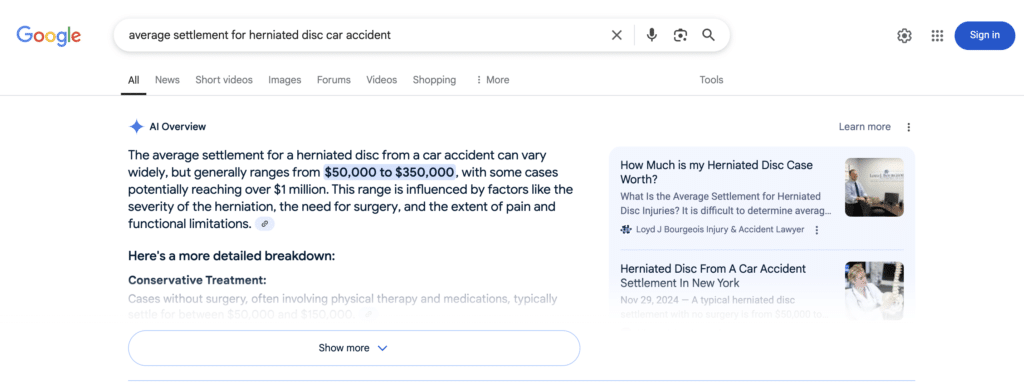Not every influencer is on TikTok
In an era defined by information overload, skepticism, and algorithm-driven decisions, it’s easy to equate the word “influencer” with viral videos and #sponsored posts. But in the world of professional services, the idea of influence is undergoing a transformation.
Today’s most effective lawyers aren’t just good at lawyering. They’re educators, advocates, and relatable human beings who show up in the digital world with the same consistency and integrity they bring to their clients. In short: they’re attorney influencers. Not the ring-light and ‘fit check kind. The kind who shape discourse, build trust, and stay top of mind when people need answers—or referrals.
Being influential in the legal space doesn’t require millions of followers, a skincare line, or an NIL deal. It requires something simpler and more enduring: the willingness to show up, share what you know, and speak to real people like a real person.
Why influence matters: Branded search, distrust, and the fight for attention
Google search behavior is changing. For a long time, law firms could drive traffic and leads by publishing content hat targeted informational, long-tail keywords like “average settlement for herniated disc car accident.” However, an increasing amount of space on Google’s search engine results pages for these informational terms is filled by the AI Overview, ads, and links to user-generated content (like Reddit forums).


Whether we like it or not, consumers are increasingly getting their information from places other than your website—forums, podcasts, social media posts, even AI. And data suggests that, when they head to Google to find a lawyer, they have a few names in mind already. Nearly half of all search queries are branded (including a person, company, or product’s name) today.
Generative AI and legal consumers’ desire for DIY options increases the risk for commodification of legal expertise. In a world where AI can churn out legal summaries and ChatGPT offers free answers, why should someone pay a lawyer? The answer: people still want credibility, clarity, and a sense of connection.
People hire lawyers based on trust. But the way we earn that trust is evolving. The modern attorney doesn’t just wait for a client to call; they show up where their audience already is, offering insight, not sales pitches.
And when attorneys consistently show up online in authentic, helpful ways, they start to shape public perception. They become the person people think of when a legal issue arises, not just because of a flashy ad campaign, but because they’ve become a trusted voice.
What is an attorney influencer?
An attorney-influencer isn’t trying to go viral. They’re focused on:
- Being findable: Showing up in Google, social media, and even inboxes.
- Being clear: Explaining complex concepts in a human way.
- Being consistent: Sharing insights regularly, not once a year in a bar journal.
This kind of influence isn’t loud. It’s durable. It’s the kind of reputation that leads to client inquiries, speaking engagements, and “I saw your post and thought of you” messages.
Examples include:
- A disability lawyer who posts weekly client FAQs on Facebook, TikTok, or Instagram.
- A business litigator who appears on small business podcasts or webinars.
- A family law attorney who writes a monthly column in a regional news outlet.
- The injury attorney who mentors student athletes, volunteers locally, and shares reflections on justice, safety, and community on social media.
These professionals aren’t chasing trends, they’re building digital and real-life credibility. Their influence grows over time because it’s rooted in consistency, substance, and service.
Why trust is the cornerstone
In legal marketing, and in Google’s search algorithm, trust isn’t just important. It’s everything.
Google’s E-E-A-T framework (Experience, Expertise, Authoritativeness, and Trustworthiness) is a foundational concept for assessing content quality. This framework guides how Google ranks content; it also mirrors how real people evaluate attorneys online.
Thoughtful, human, and consistent legal thought leadership checks every box:
- Experience: Sharing case examples, client stories, and insights from real-world practice
- Expertise: Clarifying complex legal ideas in ways non-lawyers can understand
- Authoritativeness: Appearing on podcasts, writing guest columns, and being cited by others
- Trustworthiness: Being transparent, reliable, and present—over time, across platforms
When attorneys lean into off-site influence-building, they’re not just improving SEO metrics. They’re reinforcing the values that have always built strong client relationships: clarity, consistency, and care.
Platforms that actually matter (and how to show up on them)
Influence isn’t built by dropping content into the void. It’s built through intentional presence on the platforms that matter most to your audience. You don’t need to be everywhere. But you do need to show up with consistency, clarity, and a point of view.
LinkedIn: Show up as a trusted peer, not a pitch
LinkedIn isn’t just a place to share firm updates, it’s where your reputation unfolds in real time. If you’re an attorney serving business owners, professionals, or want to nurture your referral network, it’s your most powerful stage.
You don’t need to post daily. Start with one thoughtful post a week. That might include:
- A reaction to a legal development with your take
- A brief anecdote about how you helped a client navigate a challenge
- A question that prompts conversation from your peers
But the real leverage is in your comments and messages. Engage with others’ posts, add perspective, and follow up with a connection request and a short note. You’re not just publishing—you’re participating.
Pro tip: Write like you’re speaking directly to your ideal client or referral source. Avoid abstract legal theory and focus on what people actually care about.
Podcasts: Use your voice to build trust
There’s something powerful about hearing someone’s voice. Podcasts allow you to convey empathy, clarity, and conviction in ways that text can’t. You don’t need to launch your own show—being a guest is more than enough.
Look for podcasts that speak to your audience’s world:
- A business podcast for local entrepreneurs (where you can speak about contracts or compliance)
- A nonprofit leadership show (where you can demystify governance or risk)
When you appear, don’t just teach, tell stories. Your listeners may not remember statutes, but they’ll remember how you helped someone like them. However, make sure you’re not violating your clients’ confidentiality or sharing their information without their consent.
Pro tip: Share the episode with a brief LinkedIn post or email. Use a quote from your interview as the hook.
Guest writing: Build authority in other people’s trust circles
Getting published outside your own platform expands your authority. Whether it’s a column in a business journal or a blog post on an industry site, you’re being introduced to someone else’s audience under the banner of trust.
Great guest content:
- Focuses on a specific problem (“What business owners get wrong about non-competes”)
- Offers clarity and examples, not generic tips
- Links back to your bio or a resource on your site
Don’t aim for mass exposure, aim for the right exposure. Ten new relationships from a niche column are more valuable than 10,000 passive views on a viral post.
Pro tip: Once published, reference your article in conversations, pitches, and speaking bios. You’ve just expanded your authority footprint.
Speaking engagements: Turn one talk into a year of trust-building
Live or virtual, speaking builds trust fast. People can see how you think, how you explain, and how you treat others. Whether you’re leading a CLE or giving a talk at a community nonprofit, these opportunities offer authentic exposure and long-term ROI.
What matters isn’t the size of the room, it’s what you do with the content after:
- Turn your slide deck into a blog or LinkedIn series
- Record a video excerpt to share on social
- Follow up with attendees and invite them to connect
Pro tip: Look for co-presentation opportunities with referral partners, accountants, financial advisors, therapists, non-profits that serve your clients. You gain trust by association and deepen your network at the same time.
Final thought on platforms: Don’t just post, practice presence
The goal isn’t to become a content creator. The goal is to show up as a trusted guide wherever your audience or referral base is paying attention. When you bring value, voice, and visibility to the right spaces, the results compound.
Remember: people don’t just search for answers. They search for people they trust to explain them. When your name becomes synonymous with clarity, consistency, and care, you’ve already won the platform game.
Thought leadership ≠ content marketing
Let’s be clear: this isn’t a content marketing strategy. It’s a reputation strategy. Marketing content often focuses on traffic and conversion. Thought leadership is about perspective and positioning. It doesn’t beg for attention, it earns it.
A true attorney-influencer:
- Shares what they believe, not what’s trending
- Writes or speaks to inform, not sell
- Welcomes conversation, not just clicks
And it works. Branded searches rise. Referrals increase. People remember your name—even if they aren’t ready to hire you yet.
You already have what it takes
Becoming an attorney influencer isn’t about reinventing yourself. It’s about amplifying the value you already offer—the insights you share in consultations, the care you bring to client conversations, the clarity you provide in the courtroom or boardroom.
You know your clients’ questions. Start there.
Every consultation is a content opportunity. If a client asks, “What happens to our trust if we move to another state?”—you have a post. If they’re confused about new IRS guidance or court rulings, you have a podcast topic. You don’t need to chase trends. You need to show up as the helpful, grounded expert you already are.
You don’t need to be a content machine. You need to be consistent.
Forget daily posts or a six-part video series. The attorneys who build the strongest reputations show up regularly and reliably—once a week on LinkedIn, once a month in an inbox, once a quarter on a stage. That cadence builds familiarity, which builds trust. And trust builds business.
You already have a voice, share it.
Whether you’re a passionate explainer, a careful analyst, or a warm storyteller, your communication style is an asset. The goal isn’t to become someone else. It’s to make your thinking accessible to the people who need it most. The most compelling attorney-influencers aren’t flashy, they’re clear, thoughtful, and human. They talk like real people. They tell stories. They focus on what others need to understand, not on what they want to promote.
You don’t have to do it alone.
Many great attorneys work with ghostwriters, editors, or marketing partners. Others start by jotting down talking points or recording short voice memos. You can collaborate, delegate, or experiment.
But most importantly: you have to start.
You don’t need to be famous, you just need to be known
Attorney influencers don’t need hundreds of thousands of followers. They need the right people to know their name and trust their expertise. That might be 50 general counsel in your city. Or 300 financial advisors across the state. Or 20 social workers who send referrals your way.
In a noisy digital world, trust is the loudest differentiator. And trust isn’t something you buy, it’s something you build, post by post, article by article, story by story. That’s what the best attorney-influencers understand. Their visibility isn’t performance. It’s presence. It’s consistency. And it’s a quiet promise to the world: I’ll show up, and I’ll help you understand.
If you’re a lawyer committed to doing good work, educating the public, and helping people navigate hard problems, then yes—you’re exactly the kind of professional the world needs more of.
LaFleur: Let’s build your influence, together
Whether you’re looking to amplify your thought leadership, earn media coverage that matters, or position your firm as the go-to voice in your field, we can help. At LaFleur, we work with attorneys who are ready to lead conversations, not just join them. Schedule a consultation to explore how strategic storytelling and smart media engagement can grow your brand and authority.





